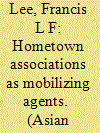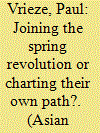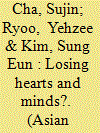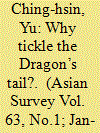|
|
|
Sort Order |
|
|
|
Items / Page
|
|
|
|
|
|
|
| Srl | Item |
| 1 |
ID:
192844


|
|
|
|
|
| Summary/Abstract |
This paper examines the associations between democratic performance, secular–traditional value orientation, and satisfaction with democracy in India and Pakistan through the lens of democratic performance and modernization theory. In an analysis of data from the 2012 World Values Survey, respect for human rights (one of two measures of democratic performance) has a stronger effect on satisfaction with democracy in India than in Pakistan. Freedom of choice influenced satisfaction with democracy only in India. Rather than having a direct effect, secular–traditional value orientation moderates the relationship between freedom of choice and satisfaction with democracy.
|
|
|
|
|
|
|
|
|
|
|
|
|
|
|
|
| 2 |
ID:
192842


|
|
|
|
|
| Summary/Abstract |
Scholars have noted that the Chinese government has been grooming a range of grass-roots social organizations in Hong Kong since the handover. Hometown associations (HTAs), in particular, are seen as an important cultural nexus capable of integrating patron–client relationships based on material benefits with social relationships rooted in common culture and identity. Few studies, however, have documented the mobilizing power of HTAs quantitatively. This article examines the mobilizing power of HTAs in the 2021 Legislative Council elections, where the state attempted to promote voter participation to protect the legitimacy of the “reformed” electoral system. Analysis at the level of District Council constituencies shows that the presence of HTAs was indeed related to higher voter turnout. I also test whether the impact of HTAs was conditioned by population characteristics. General implications of the findings are discussed.
|
|
|
|
|
|
|
|
|
|
|
|
|
|
|
|
| 3 |
ID:
192843


|
|
|
|
|
| Summary/Abstract |
This article examines Myanmar ethnic minorities’ diverse responses to the 2021 military coup. The coup prompted widespread mobilization for a national alliance that aims to replace the junta with a federal democracy. For minority actors this resistance could offer a unique opportunity to advance their demands for political autonomy, yet their responses diverged. Some joined the alliance; others declined, or accepted junta offers. Based on original interviews, this analysis unpacks the positions of ethnic rebels, civil society organizations, and parties. It suggests rebels’ strategies were influenced by their relations with civil society and military strength. Most ethnic parties avoided resistance, as they feared junta retaliation and distrusted the ousted National League for Democracy. Ethnic civil society organizations played a key coordinating role during alliance formation, enabled by its campaign experience and networks. The article’s insights into interethnic cooperation and minorities’ varied situations can benefit international actors seeking resolutions of Myanmar’s post-coup conflict.
|
|
|
|
|
|
|
|
|
|
|
|
|
|
|
|
| 4 |
ID:
192840


|
|
|
| 5 |
ID:
192841


|
|
|
|
|
| Summary/Abstract |
How does state structure affect state capacity? The long-standing debate over centralization versus decentralization overlooks the broader organizational complexity of states and state bureaucracies. To address this problem, this article proposes an alternative typology of state organizational forms: nodal versus diffuse. Nodal forms concentrate decision-making power in a limited set of key actors at intermediary levels of the state hierarchy. Diffuse forms distribute decision-making power across many overlapping lines of authority. Nodal forms contribute to state capacity by combining the coordination advantages of centralization with the accountability and autonomy of decentralization, whereas diffuse forms make these processes more challenging. Empirically, this article compares two paradigmatic cases—China’s and India’s railway bureaucracies—to show how their nodal and diffuse forms, respectively, shape their ability to complete railway projects. These findings suggest that the organizational structure of state bureaucracies is an important yet underexplored factor underlying state capacity.
|
|
|
|
|
|
|
|
|
|
|
|
|
|
|
|
| 6 |
ID:
192845


|
|
|
|
|
| Summary/Abstract |
The security situatsssion across the Taiwan Strait has recently deteriorated rapidly. Scholars and policymakers have attributed this development to the concurrence of an increasingly assertive Communist Party in China, a unilateralist Trump administration in the US, and a new DPP government in Taiwan since 2016. For the Taiwanese, the security concern is on their doorstep, but their attitudes are under-studied. I find that judgments of China’s animosity to Taiwan, China’s importance for Taiwan’s economy, (dis)agreement with the “one country, two systems” formula, concern regarding developments in Hong Kong, (dis)agreement with alliance with Japan and the US, (dis)belief in the US’s security commitment to Taiwan, and perception of the comparative strength of China versus the US are closely associated with respondents’ choice to ally with China or the US. These findings also shed light on Taiwanese (over)optimism regarding the US’s role in the wake of Chinese invasion of Taiwan.
|
|
|
|
|
|
|
|
|
|
|
|
|
|
|
|
|
|
|
|
|